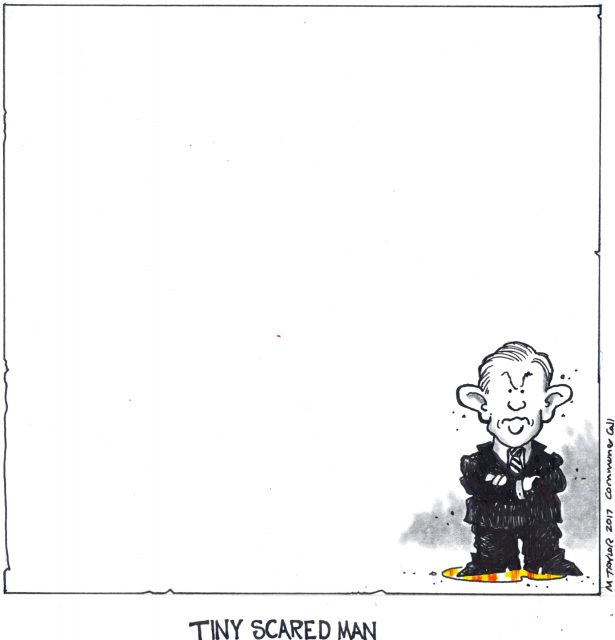
By Dan Peak
The Commoner Call (10/23/17)
Dear Fellow Readers,
Trump-Russia. What happened? What needs to happen now?
Trump continues to deny Russian involvement in aiding and abetting his election and may well be the single person in this administration clinging to that notion. To do otherwise would challenge his self-imagined mythical victory mandate.
Attorney General Jeffrey Beauregard Sessions III blandly acknowledges that no steps have been taken to prevent the ongoing Russian influence in our politics. He admits this with a golly-gee-willikers, possum-in-the-headlight look of vacant-minded innocence as if he can’t imagine who should be doing something; as if it’s never even occurred to him until asked. Such an embarrassment but then he does have his hands full further disadvantaging the Americans already most disadvantaged.
This is our leadership. These are the people responsible for protecting our institutions and us. These are the people who supposedly serve us and provide for life, liberty and justice for all.
Thanks to readers for assistance with this column.
*****
Let’s take a look at what happened this past week…
Newsweek uses interviews with former intelligence and law enforcement officials to paint a picture of the likely collusion and Russian involvement to tilt the election for Trump : How Russia & Trump Collusion Would Have Worked, From First Contact To Election Day.
““Your goal is… to weaken the United States, to sow seeds that they’re no better than we are,” said John Sipher, a former CIA operative who ran the agency’s Russia program for several years.”
What do you feel when you read this? Regardless of what if anything happened, does our political environment and execution of justice instill confidence? Do you feel our leaders are conducting themselves with moral correctness – can you say the decisions that affect us are fair and well considered? Even rational?
“Russia could have launched its efforts by assessing who within the Trump team would be amenable to working with a foreign power. “The two things I look for as an intelligence officer looking to recruit someone is ego and greed,” Sipher said. “If I look at the Trump team, I’m saying, ‘holy shit.’”
Once a target shows interest we’re already at Kompromat – that person is compromised and subject to blackmail; the rest of the story is simply a matter of how cooperative. The warnings were resisted and politicized – maybe the warnings came too late or more likely the moral imperative was always ‘winning is everything’. If you actively seek Russian assistance isn’t that collusion and complicity? At that point are you really all that worried about knock-on blackmail? Or did the light at the end of the tunnel look more like personal enrichment?
“”It doesn’t really matter what Russia might have discussed with a campaign official after initiating contact. If a Russian intelligence operative approached a campaign official offering information, and the official agreed to a meeting on that premise, “all you need to learn from that meeting is that they’re serious,” Sipher said.”
The article explains how the Russians wouldn’t have a single tool, and wouldn’t have a single target. There are many ‘what-about’ categories – social media, voter targeting, money and more:
“The major intelligence community assessment, released in January, was unequivocal in its conclusions. “Russia’s goals were to undermine public faith in the U.S. democratic process, denigrate Secretary Clinton, and harm her electability and potential presidency,” the report, produced by the Central Intelligence Agency, Federal Bureau of Investigation, and National Security Agency, said. “We further assess Putin and the Russian Government developed a clear preference for President-elect Trump.””
If you feel like ‘something’ happened you’re in good company with a majority of Americans saying, “Trump did something either illegal or unethical regarding Russia to gain office”.
If you are NOT part of that majority you might feel enabled by the advice offered by Russian President Vladimir Putin in Newsweek: Putin Says American Should Not ‘Disrespect’ Trump, Because He’s The President And Doesn’t Need Any Advice.
If you are part of the majority that feels Trump did something illegal or unethical you might see Putin’s counsel as ironic – I read this as Putin telling us to ‘back off; Trump got all the advice he needed (from Russia)’. Or, maybe it is just a matter of Vlad watching out for his investment.
While impeachment is an uncertain path, and an incomplete response to the risks we face, more and more stories are reporting, Trump Impeachment Is Most Popular Solution Among Americans, Poll Finds:
“Trump’s popularity has widely suffered as a result, making him the least popular president since at least the 1940s, and possibly ever. Another poll in August showed that, when asked the best solution to dealing with the president, most respondents chose impeachment.”
In the meantime, what should we be doing to protect ourselves?
While Newsweek focused on Putin and Russian intent to weaken the US, Politico warned we should also consider Putin’s broader goal: How To Tame Putin.
“Vladimir Putin isn’t just undermining our democracy, he’s securing his own long-term power in Russia by destabilizing the West — a strategy that United States and Europe have been dangerously slow to understand and counteract.
“That was the unnerving takeaway from a high-level working group POLITICO convened on the sidelines of the United Nations General Assembly in New York on Sept. 19. Amid threats like North Korea, ISIS and surging right-wing populism on both sides of the Atlantic, we wanted to see what some of the smartest security minds from Europe and the U.S. would say if we put them in a room and let them speak candidly about the most dire security threats facing our continents.”
There are many good points made about challenging Putin and there is a point of emphasis for how we enable Putin by abandoning our aspirations for providing leadership for the free world. But to stay focused on how we prevent the Russians from repeating their interference in future elections there is this:
“We’re getting beaten at cyber. “We are failing when it comes to figuring out how to respond to cyber intrusions,’’ one participant said. Russian hacking has exposed “that we are decades behind the way that threats are going to advance and that our most urgent need is to figure out how to catch up.”
““[Companies] think of cyber as IT until they realize they need policies in place that are much different than IT policies,” said another participant. “So the question is, ‘Who owns what piece of it? And how do we decide it?’ And we haven’t figured out those fundamental questions.””
The Trump administration denies the question let alone any attempt to address the risk.
*****
The Ballad Of Beauregard…

If you watch any video of Attorney General Jeffrey Beauregard Sessions III from the Senate Judiciary Committee hearing from this past week you were or would be taken aback by his lack of understanding, appreciation or initiative in guarding against any future risk. Sessions assures us he is unaware of any steps taken or planned. This is what failure looks like – a wide-eyed, blank expression looking back at his inquisitors.
Foreign Policy nailed the situation perfectly, reporting: Jeff Sessions Just Confessed His Negligence on Russia.
While there are many views offered of the Committee hearing, the scariest moment was set in play by Sen. Ben Sasse (R-NE), hardly a liberal voice. Instead of questioning Sessions, Sasse offered him a chance to demonstrate leadership:
“”So as the nation’s chief law enforcement officer and as a supervisor of multiple components of our intelligence community … do you think we’re doing enough to prepare for future interference by Russia and other foreign adversaries in the information space?”
“You’d think this question would be a golden opportunity for Sessions. After all, if you’re a man who has had some — ahem — inconvenient interactions with former Ambassador Sergey Kislyak, you might relish the chance to answer a question about what you are doing to prevent Russian interference in the future, as a chance to go on offense and show how serious you are about tackling a problem that has undermined your reputation.
“But Sessions’s answer did not inspire confidence: “Probably not. We’re not. And the matter is so complex that for most of us, we are not able to fully grasp the technical dangers that are out there.””
Probably not?
Really, Beauregard?
Sessions agreed there was a need for a “real review”, to which Sasse then asked for him to explain his intent, his plan:
““So what steps has the department taken,” or should it take, “to learn the lessons of 2016 … in fighting foreign interference?” he asked.”
“Crickets from Sessions.”
Back to the Politico article, the group convened by Politico did have ideas. Remember, Trump has done nothing – said nothing – about the new round of sanctions against Russia overwhelmingly approved by Congress in August.
“Participants agreed that U.S. and EU sanctions imposed on Russia after Putin’s 2014 seizure of Crimea are exacting a toll on his economy and have raised the cost of his effort to destabilize the rest of Ukraine. But they warned of fissures in the Western coalition, and said Ukraine’s fate may depend on staying united.”
While Putin may feel he has gotten a poor return on his investment in Trump he must at least begrudgingly credit Trump with not making the sanctions worse. But the Trump administration is not the only area of risk sitting on their hands, for their own reasons Facebook, Google and Twitter have their own growing list of failures:
“NATO and the EU should expand their efforts to detect, analyze and rebut Russian disinformation, the participant said. Both have small “cottage industries” underway, but they “could be funded five times more substantially so that you have a sort of core capability to counter the Russian disinformation.”
““The defense is exposure. Exposing the bots, the trolls, with a big red stamp: ‘Russian Propaganda’,” another participant said.”
As I reported in the last edition, Sen. John McCain (R-AZ) is one of the people providing some leadership to combat this risk and he backs an initiative that gets right at heart of the worst fears of the tech companies:
This is behind a Financial Times paywall but the headline is a great summary: Russia Ads Bill Gains Bipartisan Support In US.
A proposed initiative named the Honest Ads Act is early in gestation so we’ll simply note:
“US legislation targeting digital advertising platforms including Facebook, Google and Twitter has won bipartisan support after senator John McCain became the first Republican to back a bill to extend rules covering political ads to online ones.”
Not enough is happening to limit the multiple risks to our ability to conduct elections free of Russian influence. We’ve repeatedly been assured ‘they will be back’, yet Trump does nothing but Tweet and tantrum.
To close for this edition I’ll use the closing comments and worst fears of the Politico article group and I wonder if this encourages feelings of optimism or dismay?
We ended the conversation by asking each participant to describe the threat to the United States and Europe that keeps them up at night. Here’s a selection:
“What keeps me up at night is the danger of miscalculation.”
“The political lack of confidence, self-confidence, throughout the West. The sense that it’s just not working for us.”
“That we will lose faith in each other is the deepest threat that we face. I agree with that. I think that is the deepest threat.”
“My nightmare … is just the concern that the new [U.S.] presidential administration will undo a lot of the work that we did over the past 50 years.”
Without doubt, Trump is the greatest risk we face.

